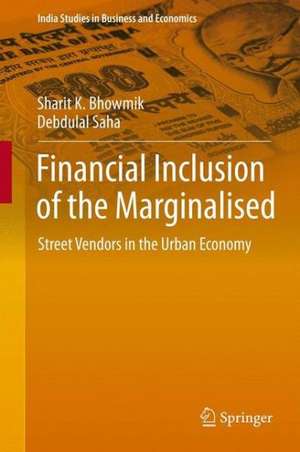Financial Inclusion of the Marginalised: Street Vendors in the Urban Economy: India Studies in Business and Economics
Autor Sharit K. Bhowmik, Debdulal Sahaen Limba Engleză Hardback – 14 iul 2013
| Toate formatele și edițiile | Preț | Express |
|---|---|---|
| Paperback (1) | 549.01 lei 38-44 zile | |
| Springer India – 8 aug 2015 | 549.01 lei 38-44 zile | |
| Hardback (1) | 559.74 lei 38-44 zile | |
| Springer India – 14 iul 2013 | 559.74 lei 38-44 zile |
Din seria India Studies in Business and Economics
- 18%
 Preț: 734.27 lei
Preț: 734.27 lei -
 Preț: 361.77 lei
Preț: 361.77 lei - 18%
 Preț: 1006.24 lei
Preț: 1006.24 lei - 18%
 Preț: 952.89 lei
Preț: 952.89 lei - 20%
 Preț: 883.20 lei
Preț: 883.20 lei -
 Preț: 186.41 lei
Preț: 186.41 lei - 15%
 Preț: 636.94 lei
Preț: 636.94 lei - 15%
 Preț: 647.27 lei
Preț: 647.27 lei - 15%
 Preț: 646.30 lei
Preț: 646.30 lei -
 Preț: 409.89 lei
Preț: 409.89 lei -
 Preț: 372.98 lei
Preț: 372.98 lei -
 Preț: 389.88 lei
Preț: 389.88 lei - 18%
 Preț: 894.03 lei
Preț: 894.03 lei - 15%
 Preț: 644.30 lei
Preț: 644.30 lei - 15%
 Preț: 528.30 lei
Preț: 528.30 lei - 15%
 Preț: 643.65 lei
Preț: 643.65 lei - 15%
 Preț: 644.82 lei
Preț: 644.82 lei - 15%
 Preț: 660.37 lei
Preț: 660.37 lei -
 Preț: 386.00 lei
Preț: 386.00 lei - 15%
 Preț: 643.99 lei
Preț: 643.99 lei -
 Preț: 386.68 lei
Preț: 386.68 lei -
 Preț: 390.08 lei
Preț: 390.08 lei -
 Preț: 365.76 lei
Preț: 365.76 lei -
 Preț: 393.52 lei
Preț: 393.52 lei - 15%
 Preț: 656.74 lei
Preț: 656.74 lei - 24%
 Preț: 699.22 lei
Preț: 699.22 lei -
 Preț: 369.80 lei
Preț: 369.80 lei - 15%
 Preț: 642.68 lei
Preț: 642.68 lei -
 Preț: 388.90 lei
Preț: 388.90 lei - 15%
 Preț: 649.87 lei
Preț: 649.87 lei - 15%
 Preț: 645.28 lei
Preț: 645.28 lei -
 Preț: 372.66 lei
Preț: 372.66 lei -
 Preț: 389.17 lei
Preț: 389.17 lei - 20%
 Preț: 569.00 lei
Preț: 569.00 lei - 15%
 Preț: 641.85 lei
Preț: 641.85 lei -
 Preț: 392.97 lei
Preț: 392.97 lei - 15%
 Preț: 643.84 lei
Preț: 643.84 lei - 24%
 Preț: 656.29 lei
Preț: 656.29 lei - 15%
 Preț: 651.34 lei
Preț: 651.34 lei - 15%
 Preț: 641.53 lei
Preț: 641.53 lei - 15%
 Preț: 640.37 lei
Preț: 640.37 lei - 20%
 Preț: 569.85 lei
Preț: 569.85 lei
Preț: 559.74 lei
Preț vechi: 699.68 lei
-20% Nou
Puncte Express: 840
Preț estimativ în valută:
107.12€ • 111.15$ • 89.53£
107.12€ • 111.15$ • 89.53£
Carte tipărită la comandă
Livrare economică 12-18 martie
Preluare comenzi: 021 569.72.76
Specificații
ISBN-13: 9788132215059
ISBN-10: 8132215052
Pagini: 160
Ilustrații: XXIV, 134 p.
Dimensiuni: 155 x 235 x 14 mm
Greutate: 0.4 kg
Ediția:2013
Editura: Springer India
Colecția Springer
Seria India Studies in Business and Economics
Locul publicării:New Delhi, India
ISBN-10: 8132215052
Pagini: 160
Ilustrații: XXIV, 134 p.
Dimensiuni: 155 x 235 x 14 mm
Greutate: 0.4 kg
Ediția:2013
Editura: Springer India
Colecția Springer
Seria India Studies in Business and Economics
Locul publicării:New Delhi, India
Public țintă
ResearchCuprins
Chapter 1: Introduction: Street Vendors in the Urban Economy.- Chapter 2: The Field: Profile of the Cities.- Chapter 3: Why do Street Vendors Need Finance?.- Chapter 4: Sources of Finance.- Chapter 5: How Can Financial Institutions Help Out?.- Chapter 6: Recommendations and Conclusion.
Notă biografică
Sharit Bhowmik is Professor and Chairperson, Centre for Labour Studies, Tata institute of Social Sciences, Mumbai. He has been engaged in research on informal employment, especially street vendors, for the past 15 years. He was a member of the National Task Force on Street Vendors and of the Drafting Committee for the National Policy (2004) appointed by the Ministry of Urban Employment and Poverty Alleviation (now renamed the Ministry of Housing and Poverty Alleviation). He has edited a volume on Street Vendors in the Global Urban Economy (Routledge, 2010) and published a book titled Industry, Labour and Society (Orient Blackswan, 2012). He has also published several articles in peer reviewed journals and as chapters in books on labour, informal economy and worker co-operatives, as well as a monograph on tea plantation labour.
Debdulal Saha is Assistant Professor at the Tata Institute of Social Sciences, Guwahati Campus. He received his MA in Economics from theUniversity of North Bengal and his PhD from the TISS Mumbai. As a PhD scholar, he was a recipient of the prestigious scholarship from the International Center for Development and Decent Work (ICDD), part of the German Academic Exchange Service (DAAD).He has published papers on street vendors and the informal economy in national and international journals and has served as a research coordinator in three major research projects on street vendors in the urban informal economy. He has co-edited a book on the Food Crisis and its Implication on Labour.
Debdulal Saha is Assistant Professor at the Tata Institute of Social Sciences, Guwahati Campus. He received his MA in Economics from theUniversity of North Bengal and his PhD from the TISS Mumbai. As a PhD scholar, he was a recipient of the prestigious scholarship from the International Center for Development and Decent Work (ICDD), part of the German Academic Exchange Service (DAAD).He has published papers on street vendors and the informal economy in national and international journals and has served as a research coordinator in three major research projects on street vendors in the urban informal economy. He has co-edited a book on the Food Crisis and its Implication on Labour.
Textul de pe ultima copertă
This book is the product of a study conducted by the Tata Institute of Social Sciences (TISS) in collaboration with the United Nations Development Programme (UNDP) and Ministry of Urban Housing and Poverty Alleviation (MoHUPA). Its objective is to highlight some of the problems faced by street vendors in conducting their daily business and to examine how financial institutions, especially those in the banking sector, can include street vendors in their credit policies. Data was collected from 15 cities across the country. Not surprisingly, while issues such as public space utilisation have been deliberated upon at length, those concerning the nature of credit transactions and concurrently the financial inclusion of street vendors have scarcely received focussed attention. In the absence of formal credit, street vendors largely depend on loan sharks, who charge high interest rates ranging from 350% to 800% per annum. The problem of formal credit aside, another equally important factoris the inflexible attitude of the civic authorities towards street vending. Given their informal status, this is particularly apparent because they are forced to conduct business in the absence of legal protection, making them vulnerable to rent seeking by the authorities. The acceptance of the National Policy for Urban Street Vendors by a few states and the subsequent bill to protect the livelihood of street vendors should help them gain legitimacy and subsequently credit to run their businesses at proper rates. The book examines and analyses these issues.
Caracteristici
Documents the current degree of financial inclusion among street vendors Identifies the policy constraints and drivers for the broader adoption of financial services appropriate to the needs of the street vendors Presents a gender-disaggregated picture of the financial inclusion among street vendors, improving the general understanding of the problems faced by women street vendors Includes supplementary material: sn.pub/extras











